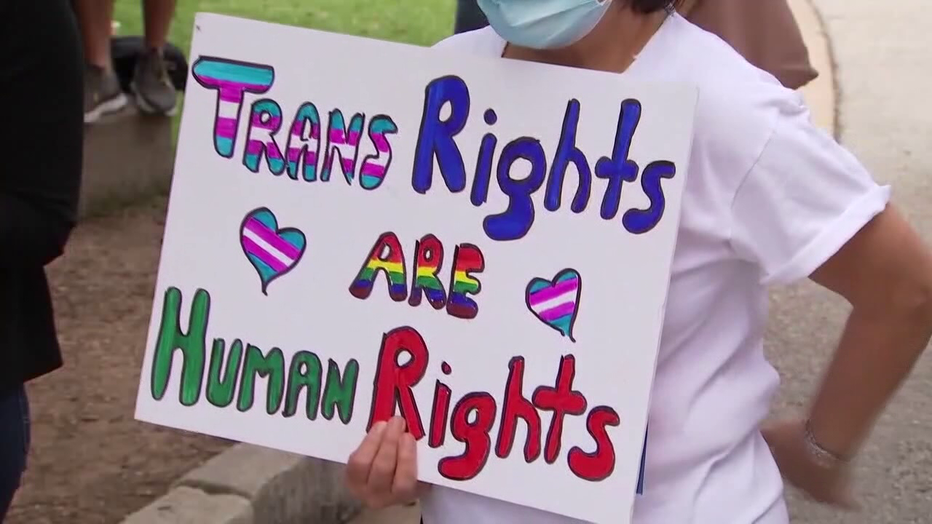Federal judge rejects Florida's transgender coverage ban

Local mother and transgender daughter planning to leave Florida
Heather St. Armand, a Tampa Bay area resident, reached her breaking point after a new law took effect this week that restricts gender-affirming care for transgender youth.
TALLAHASSEE, Fla. - Calling the state’s policy "invidious discrimination" against transgender people, a federal judge ruled that Florida’s prohibition against Medicaid coverage for gender-affirming care such as puberty blockers and hormone therapy is unconstitutional.
U.S. District Judge Robert Hinkle’s ruling Wednesday largely echoed a decision he issued earlier this month in a challenge to state restrictions on gender-affirming care for children and adults.
"Same record, same findings and conclusions," Hinkle’s 54-page ruling said. "Gender identity is real."
RELATED: Federal judge blocks Florida’s ban that would impact transgender children’s access to treatments
Wednesday’s ruling came in a lawsuit filed by two adults and the parents of two children against the state Agency for Health Care Administration, which runs most of the Medicaid program. The agency last year adopted a rule banning Medicaid reimbursements to health-care providers for "sex-reassignment" treatments, such as puberty blockers, hormone therapy and surgeries. Hinkle’s ruling addressed only gender-affirming medicines.
The health agency adopted the rule based on a report that concluded such treatment was "experimental" and "not medically necessary," and thus did not meet the threshold for Medicaid coverage. The report was by researchers who oppose gender-affirming care.
But Hinkle, who held a two-week trial in the challenge, found that the state only sought evidence to support a foregone decision to scrap the coverage.

The process "was, from the outset, a biased effort to justify a predetermined outcome, not a fair analysis of the evidence," Hinkle wrote. "The conclusion was not supported by the evidence and was contrary to generally accepted medical standards."
READ: Human Rights Campaign declares state of emergency warning for LGBTQ+ people
The state had no "rational basis to categorically ban these treatments or to exclude them from the state’s Medicaid coverage," the judge said. "The record includes no evidence that these treatments have caused substantial adverse clinical results in properly screened and treated patients."
Gov. Ron DeSantis, a 2024 Republican presidential candidate, and his legislative allies have made a high-profile issue of targeting treatments for transgender people.
The lawsuit was amended this spring to include a challenge to a new state law that cemented the Medicaid coverage ban. The law (SB 254) also made it a crime for doctors to order puberty blockers or hormone therapy for children and imposed new restrictions on gender-affirming care for adults.
Hinkle’s ruling Wednesday harshly criticized the state’s handling of treatment for transgender people, noting that the "widely accepted standard of care calls for evaluation and treatment by a multidisciplinary team."
Proper treatment begins with mental-health therapy and is followed, when appropriate, by puberty blockers and hormones, the judge wrote.
MORE: Drag performances still planned for St. Petersburg Pride Parade, organizers say
"Florida has adopted a rule and statute that prohibit Medicaid payment for these treatments even when medically appropriate. The rule and statute violate the federal Medicaid statute, the (U.S. Constitution’s) Equal Protection Clause and the Affordable Care Act’s prohibition of sex discrimination," he wrote.

Federal judge blocks parts of transgender treatment ban
A federal judge on Tuesday blocked Florida?s ban on the use of puberty blockers and hormone therapy to treat three children diagnosed with gender dysphoria, calling the prohibition "an exercise in politics, not good medicine."
Hinkle disputed state allegations that many young patients later "regret" using gender-affirming care.
"Regret is rare; indeed, the defendants have offered no evidence of any Florida resident who regrets being treated with GnRH agonists (puberty blockers) or hormones," Hinkle wrote, noting that 98 percent of children who use puberty blockers go on to use cross-sex hormones.
Lawyers for the plaintiffs hailed Hinkle’s decision.
"The court’s order is a much-needed win for Floridians, amidst a climate where the rights of transgender individuals are being relentlessly attacked by the state," Simone Chriss, director of the Transgender Rights Initiative at Southern Legal Counsel, said in a statement late Wednesday. "Judge Hinkle said it best — ‘the statute and the rule were an exercise in politics, not good medicine’ — and today’s ruling sends a strong message that the state of Florida cannot continue to play politics with people’s lives. We are so grateful to the courageous plaintiffs who made this case possible, and so grateful to the court for holding the state accountable for its unapologetic bigotry."
August Dekker, a 29-year-old Hernando County man who is a plaintiff in the lawsuit, also praised Hinkle’s ruling.
PREVIOUS: Florida sues feds over college accreditation
"I am extremely relieved and pleased with this decision so I don’t have to worry about whether I will be able to get the medical care I need. Florida’s policy effectively denied me the treatment my doctors recommended, because as a low-income Floridian with disabilities, I rely on Medicaid to afford my health care. I am also happy for other transgender Floridians that get care through Medicaid, as now access to that lifesaving, critical care can continue," Dekker said in a statement.
Hinkle’s ruling rejected the state’s justification for banning Medicaid coverage because gender dysphoria is difficult to diagnose. The federal government defines gender dysphoria clinically as "significant distress that a person may feel when sex or gender assigned at birth is not the same as their identity."

"The difficulty diagnosing a patient calls for caution. It does not call for a one-size-fits-all refusal to cover widely accepted medical treatment. It does not call for the state to make a binary decision not to cover the treatment even for a properly diagnosed patient," the judge wrote.
Hinkle noted that his order copied and pasted much of his June 6 ruling that rejected a state prohibition on gender-affirming care for children. That ruling affected a group of transgender children and parents who challenged the prohibition.
"The elephant in the room should be noted at the outset. Gender identity is real. The record makes this clear. The medical defendants, speaking through their attorneys, have admitted it. At least one defense expert also has admitted it," he wrote in both rulings.
Although the vast majority of medical groups support gender-affirming care, the DeSantis administration and state medical boards argued that the treatment isn’t supported by high-quality clinical research. The state also alleged that medical groups supported the care for ideological, not clinical, reasons.
But Hinkle rejected the state’s stance.
"If ever a pot called a kettle black, it is here. The statute and the rules were an exercise in politics, not good medicine," he wrote.

